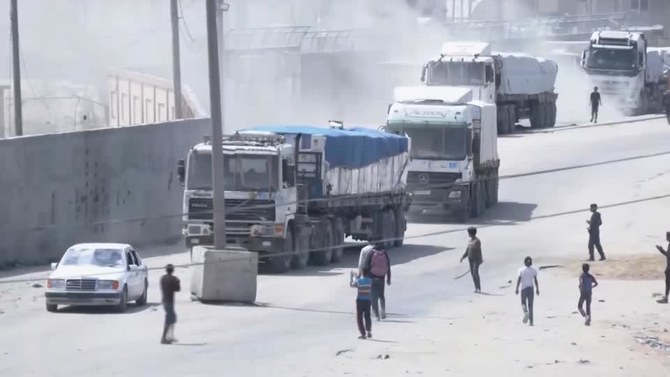JERUSALEM/GENEVA: Israel has accused the United Nations of undercounting aid entering Gaza, saying on Wednesday the UN was using a flawed approach meant to conceal its own distribution difficulties, amid growing pressure on Israel to let in more relief supplies.
While Israel says the number of trucks entering Gaza has risen sharply in recent days, the UN has given much lower figures, and says it is still far less than the amount required to meet humanitarian needs.
Six months into Israel’s ground and air offensive, triggered by the Hamas attack of Oct. 7, most of Gaza’s 2.3 million people are homeless, parts of the enclave face famine, civilian infrastructure has been devastated and disease is widespread.
Aid agencies, including UN agencies, have urged Israel to do more to let in food and other humanitarian aid, and to facilitate its distribution around the tiny enclave.
While Israel said 419 trucks entered the Gaza Strip on Monday, the main UN agency there, UNRWA, said only 223 trucks had come in on that day.
Both COGAT, the Israeli military branch responsible for aid transfers, and UN agencies have said the discrepancy in numbers results from different ways of counting.
“The UN’s incorrect numbers are a result of their flawed counting method. Rather than counting the actual number of trucks that enter the Gaza Strip, in an attempt to conceal their logistical distribution difficulties, they only count the trucks that they have picked up from the Gazan side of the border,” COGAT said in a statement.
On Tuesday, Jens Laerke the spokesperson for the UN humanitarian agency OCHA said the Israeli count was for trucks that were only partially filled to comply with its military’s screening requirements.
“COGAT counts what they screen and send across the border. We count trucks that arrive in our warehouses,” Laerke said.
“Trucks that go in, screened by COGAT, are typically only half full. That is a requirement that they have put in place for screening purposes. When we count the trucks on the other side, when they have been reloaded, they are full,” he said.
Other Israeli restrictions mean the trucks often do not move through the border and into warehouses in a single day, further complicating a clear count, Laerke said.
“Egyptian drivers and trucks can never be in the same area at the same time as Palestinian drivers and trucks. That means there is not a smooth handover. First everything has to come in, has to be offloaded, everybody has to go out, before a new set of trucks from inside Gaza with Palestinian plates, with vetted Palestinian drivers, can go in and pick it up,” he said.
Israel and UN disagree over Gaza aid figures
https://arab.news/9axbt
Israel and UN disagree over Gaza aid figures

- Aid agencies, including UN agencies, have urged Israel to do more to let in food and other humanitarian aid
- While Israel said 419 trucks entered the Gaza Strip on Monday, UNRWA said only 223 trucks had come in on that day
Flights to and from Yemen’s Sanaa airport suspended following Israeli attack, director says

All flights to and from Yemen’s Sanaa International Airport have been suspended until further notice due to extensive damage following Israeli strike, the airport’s general director said on Wednesday in a post on X.
The Israeli military carried out an airstrike on Yemen’s main airport in Sanaa on Tuesday, its second attack in two days on Iran-aligned Houthis after a surge in tensions between the group and Israel.
Gaza rescuers say 31 killed in Israeli strikes on school sheltering displaced

GAZA CITY: Gaza’s civil defense agency said Wednesday that Israeli strikes on a school sheltering displaced people in the war-ravaged Palestinian territory killed 31 people and wounded dozens, with Israel saying it had targeted Hamas militants.
Gaza civil defense media officer Ahmad Radwan told AFP that a total of 31 people were killed and dozens more wounded in Israeli strikes “on a school sheltering displaced persons” in the Bureij refugee camp in the center of the Gaza Strip.
The Israeli military meanwhile said in a statement that its forces had struck a “Hamas command and control center in the central Gaza Strip” which was used “to store weapons.”
The strikes came as Israel drew international condemnation on Tuesday over its plans for an expanded Gaza offensive, as the country’s far-right finance minister called for the Palestinian territory to be “destroyed.”
Nearly all of Gaza’s 2.4 million people have been displaced at least once during the war, sparked by Hamas’s October 7, 2023 attack on Israel.
On Tuesday, Hamas dismissed as pointless ceasefire talks with Israel, accusing it of waging a “hunger war” on Gaza.
Israel’s military resumed its offensive on the Gaza Strip in March, ending a two-month truce that saw a surge in aid into the territory and the release of hostages in exchange for Palestinian prisoners held by Israel.
Gaza aid dries up as Israeli blockade enters a third month

- The current blockade has lasted longer than any previous Israeli halt in aid to Gaza since the Israel-Hamas war began
JERUSALEM: Israel has blockaded all entrances to the Gaza Strip since March.
While pummeling the strip with airstrikes, it has banned any food, water, shelter or medication from being trucked into the Palestinian territory, where the UN says the vast majority of the population is reliant on humanitarian aid to survive. Israel says the blockade aims to pressure Hamas to release the hostages it still holds. Of the 59 captives remaining in Gaza, 21 are believed to still be alive, US President Donald Trump said Tuesday, revealing that three had died.
Here’s a look at the humanitarian crisis spiraling in Gaza, through key statistics and charts:
The current blockade has lasted longer than any previous Israeli halt in aid to Gaza since the Israel-Hamas war began. Hamas attacked Israel on Oct. 7, 2023 and Israel froze aid to Gaza for two weeks.
Now, Gaza is entering its third month without supplies. Thousands of trucks queue along the border of the territory, waiting to be let in. Community kitchens are closing down and bakeries are running out of fuel. Families spend hours waiting in line for small portions of rice.
In their desperation, Palestinians have begun scavenging warehouses and stores for anything left. Aid groups report a rise in looting incidents over the last week. At least some have been looted by armed groups.
Meanwhile, Israel is moving forward with plans to seize all of Gaza and to stay in the Palestinian territory for an unspecified amount of time. It says it will expand operations there, defying calls for an immediate renewal of a ceasefire from families whose relatives are still held hostage in Gaza.
Israel’s offensive has displaced more than 90 percent of Gaza’s population and, Palestinian health officials say, killed more than 52,000 people, many of them women and children. Palestinian officials do not distinguish between combatants and civilians in their count.
UAE mediates deal for release of further 410 Russian and Ukrainian prisoners of war

- It is the 15th in a series of UAE-mediated prisoner-swap agreements that have resulted in the release of 4,181 captives in total
LONDON: The UAE has mediated the 15th in a series of agreements between Russia and Ukraine for the release of prisoners of war, as part of its ongoing diplomatic efforts to help resolve the conflict.
Under the latest prisoner-swap deal, 205 Ukrainians and 205 Russians were freed on Tuesday, the Emirates News Agency reported. The Emirati Ministry of Foreign Affairs said a total of 4,181 Russian and Ukrainian captives have now been released as a result of its mediation efforts, the continuing success of which reflects the level of trust Kyiv and Moscow have in the UAE.
The UAE remains determined to find a peaceful resolution to the war in Ukraine, which began in February 2022, and to help ease the humanitarian suffering it has caused, the ministry added.
Lebanon says one killed in Israeli strike on south

- The ministry said in a statement that the “Israeli enemy” strike on Kfar Rumman killed one person and wounded three others
- Israel has continued to launch regular strikes in Lebanon despite the November 27 truce
BEIRUT: Lebanon’s health ministry said an Israeli strike Tuesday on a car in the country’s south killed one person, the latest attack despite a fragile ceasefire between Hezbollah militants and Israel.
The ministry said in a statement that the “Israeli enemy” strike on Kfar Rumman killed one person and wounded three others.
Lebanon’s state-run National News Agency said the car was hit with a “guided missile” on the road linking the town of Kfar Rumman with the nearby city of Nabatieh.
There was no immediate comment from the Israeli military.
Israel has continued to launch regular strikes in Lebanon despite the November 27 truce which sought to halt more than a year of hostilities with Hezbollah including two months of all-out war, with a heavy Israeli bombing campaign and ground incursion.
Under the deal, Hezbollah was to pull its fighters north of Lebanon’s Litani River, some 30 kilometers (20 miles) from the Israeli border, and dismantle any remaining military infrastructure to its south.
Israel was to withdraw all its forces from south Lebanon, but it has kept troops in five positions that it deems “strategic.”
A Lebanese security source told AFP that Hezbollah had withdrawn fighters from south of the Litani and dismantled most of its military infrastructure in that area.
Lebanon says it has respected its commitments and has called on the international community to pressure Israel to end its attacks and withdraw from the five border positions.






















